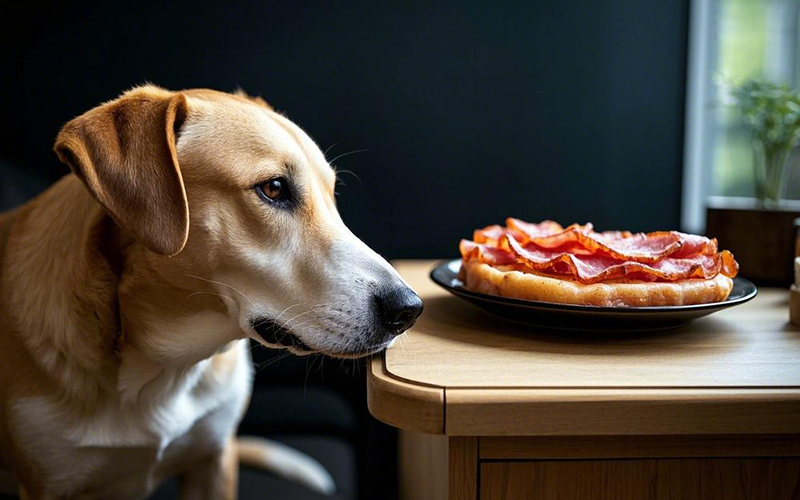Can Dogs Eat Raw Bacon? What You Need to Know
- 15 Mar 2025 13:53
Bacon is a favorite treat for many people, and you might be tempted to share a bite with your dog. However, when it comes to raw bacon, it’s a different story. While bacon itself isn’t inherently toxic to dogs, there are risks associated with feeding them raw bacon. Let’s explore whether dogs can safely eat raw bacon and what precautions you should take. 🥓🐕

1. Can Dogs Eat Raw Bacon?
No, dogs should not eat raw bacon. Raw bacon, like other raw meats, poses several health risks due to the potential for harmful bacteria and parasites. While cooked bacon is generally safe for dogs in moderation, raw bacon can cause a variety of health problems.
2. Potential Risks of Feeding Raw Bacon to Dogs
Here are the primary risks associated with feeding your dog raw bacon:
Bacterial Contamination: Raw bacon, like any raw meat, can contain harmful bacteria such as Salmonella or E. coli. These bacteria can lead to food poisoning, causing symptoms like vomiting, diarrhea, fever, and abdominal pain. Dogs, especially those with compromised immune systems, are more susceptible to bacterial infections from raw meat.
Parasites: Raw pork can also carry parasites such as Trichinella spiralis, which causes trichinosis. This parasite can lead to serious health issues, including muscle pain, fever, and swelling.
Fatty Content: Bacon is high in fat, and raw bacon can be even fattier than cooked bacon. Consuming too much fat can lead to obesity and pancreatitis (inflammation of the pancreas), which is a painful and potentially life-threatening condition for dogs.
Risk of Salt and Preservatives: While the salt content in bacon isn’t necessarily a risk from the raw form alone, bacon is often cured with preservatives like nitrates and nitrites, which can be harmful to dogs in large quantities. These additives are not ideal for your dog’s health and can contribute to high blood pressure and other issues.
3. Can Dogs Eat Cooked Bacon?
Yes, dogs can eat cooked bacon in moderation, but it should be an occasional treat. When cooked, bacon loses much of its harmful bacteria and parasites. However, it’s still high in fat and salt, so it should only be given to dogs in small amounts. Excessive bacon consumption can lead to weight gain and health problems like pancreatitis or heart disease.
If you’re going to give your dog bacon, here are a few guidelines:
Cook the Bacon Thoroughly: Always cook bacon fully to reduce the risk of bacterial contamination or parasites.
Limit the Quantity: Offer bacon as a rare treat and avoid making it a regular part of your dog’s diet.
Remove Excess Fat: Trim off as much fat as possible before giving it to your dog.
4. Healthier Alternatives to Bacon for Dogs
If you want to treat your dog with something special that’s safer than bacon, consider these healthier alternatives:
Lean Meat: Offer small pieces of lean, cooked chicken, turkey, or beef as a protein-rich treat.
Dog-Specific Treats: There are many healthy, dog-friendly treats available that are low in fat and made specifically for canine health.
Carrots and Apples: These are crunchy, low-calorie options that are good for your dog’s teeth and overall health.
5. How PettureX Can Help You Make Safe Dietary Choices for Your Dog
If you're unsure about whether certain foods are safe for your dog, PettureX can help! PettureX is an AI-powered pet health assistant that provides 24/7 support and advice on pet diets and health. With its image recognition tool, PettureX can help you identify whether a food or ingredient is safe for your dog and help keep your pet healthy. 🐕📱
6. Conclusion: Can Dogs Eat Raw Bacon?
No, raw bacon should be avoided as it poses several risks to your dog’s health, including bacterial contamination, parasites, and high-fat content. While cooked bacon can be safe in small amounts, it should be offered sparingly due to its high fat and salt content.
For a healthier treat, consider offering your dog lean meats or dog-specific treats. And remember, when in doubt, PettureX is always there to help you make informed decisions about your dog’s diet and health. 🥓🐾
So, while bacon may be tempting to share, it’s best to keep raw bacon away from your dog and opt for safer, healthier alternatives!
Related

Why is Regular Dog Grooming So Important?
- 21 Jun 2025
Can Dogs Eat Kiwis? A Vet-Approved Guide to This Fuzzy Fruit
- 10 Jun 2025
Can Dogs Eat Curry? Unpacking Risks, Benefits, and Safe Alternatives for Your Canine Companion
- 3 Jun 2025
Can Dogs Eat Cooked Carrots? A Crunchy & Colorful Canine Query!
- 29 May 2025
Can Dogs Eat Cooked Cabbage? Unveiling the Crunchy Truth for Your Canine!
- 29 May 2025
Can Dogs Eat Citrus? Peeling Back the Zesty Truth for Your Pup!
- 28 May 2025
Can Dogs Eat Cinnamon Applesauce (A Little Bit)? The Sweet and Spicy Truth!
- 28 May 2025
Can Dogs Eat Chorizo? Sizzling a Warning for Your Furry Friend!
- 27 May 2025
Can Dogs Eat Chili? A Spicy Topic for Canine Consumption!
- 27 May 2025
Can Dogs Eat Raw Chicken? Unveiling the Risks and Realities
- 26 May 2025
